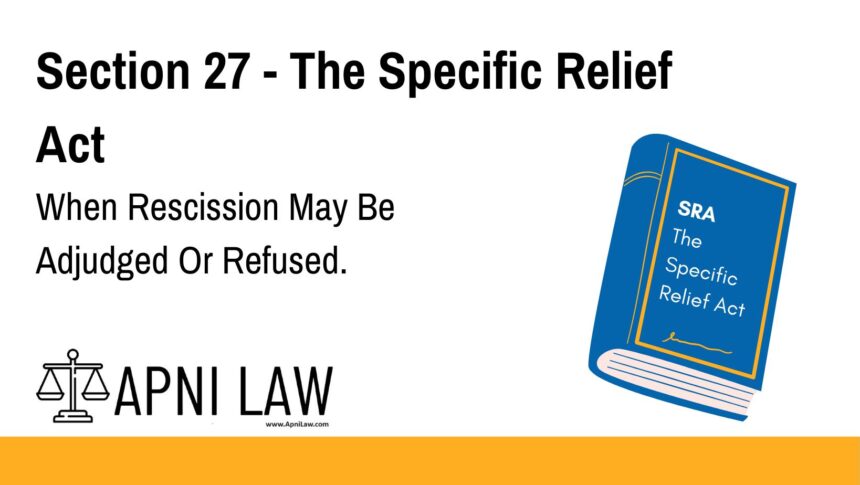Code: Section 27 – The Specific Relief Act
27.
(1) Any person interested in a contract may sue to have it rescinded, and such rescission may be adjudged by the court in any of the following cases, namely:
(a) where the contract is voidable or terminable by the plaintiff;
(b) where the contract is unlawful for causes not apparent on its face and the defendant is more to blame than the plaintiff.
(2) Notwithstanding anything contained in sub-section (1), the court may refuse to rescind the contract—
(a) where the plaintiff has expressly or impliedly ratified the contract;
(b) where, owing to the change of circumstances which has taken place since the making of the contract (not being due to any act of the defendant himself), the parties cannot be substantially restored to the position in which they stood when the contract was made;
(c) where third parties have, during the subsistence of the contract, acquired rights in good faith without notice and for value;
(d) where only a part of the contract is sought to be rescinded and such part is not severable from the rest of the contract.
Explanation: In this section “contract” in relation to the territories to which the Transfer of Property Act, 1882 does not extend, means a contract in writing.
Explanation of Section 27 – The Specific Relief Act
Section 27 of The Specific Relief Act deals with the right to rescind a contract and the conditions under which the court may allow or deny such a request.
Key Provisions:
- Grounds for Rescission: A person may seek to rescind a contract if it is voidable or terminable by them, or if the contract is unlawful but the defendant is more at fault.
- Refusal of Rescission: The court may refuse to rescind the contract if:
- The plaintiff has already ratified the contract.
- There has been a change in circumstances that makes it impossible to restore the parties to their original position.
- Third parties have acquired rights under the contract in good faith.
- Only a part of the contract is being rescinded, and it cannot be severed from the rest.
Illustration
Example 1: Rescission of a Voidable Contract
A contract for the sale of a house is made between two parties. The buyer, after discovering that the seller had no legal right to sell, sues for rescission under Section 27. The court may allow the rescission if the contract was voidable by the buyer due to misrepresentation by the seller.
Example 2: Court Refuses Rescission
A person who entered into a contract of sale for goods later seeks to rescind the contract. However, due to a change in market conditions (which was not the seller’s fault), the goods cannot be returned to their original condition. The court may refuse rescission due to the change in circumstances as per Section 27(2)(b).
Common Questions and Answers on Section 27
1. What is meant by “rescission” of a contract under Section 27?
- Answer: Rescission refers to the cancellation or annulment of a contract, making it as though the contract never existed.
2. Can a person rescind a contract if they have already accepted its terms?
- Answer: No, if the plaintiff has expressly or impliedly ratified the contract, the court will not grant rescission as per Section 27(2)(a).
3. What happens if third parties have acquired rights under the contract?
- Answer: If third parties have acquired rights in good faith during the existence of the contract, the court may refuse to rescind the contract due to these third-party rights, as stated in Section 27(2)(c).
4. When can a part of the contract be rescinded?
- Answer: The court will not allow rescission of only a part of the contract unless the part can be severed from the rest, as outlined in Section 27(2)(d).
Conclusion
Section 27 of the Specific Relief Act ensures that rescission of contracts is not taken lightly. It provides a legal framework for when rescission is possible, and the conditions under which the court may refuse rescission, protecting both parties and third parties involved in the contract. This section serves to balance the interests of fairness and practicality in contract disputes.








